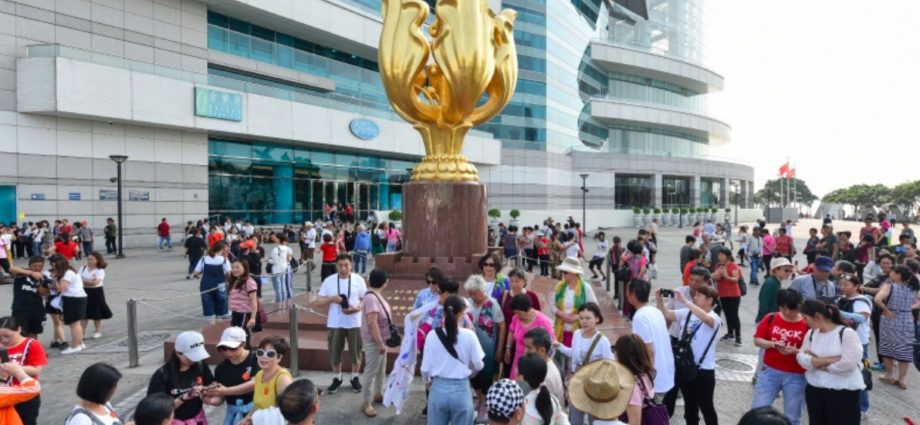More Chinese tourists have visited Hong Kong following the cancellation Monday of the quota system for cross-border travel and pre-departure Covid test requirements.
A total of 273,000 people arrived in or departed from Hong Kong on Tuesday, compared with about 3,500 on the year-earlier day, according to the Immigration Department. The Tuesday number is about one-third of the pre-pandemic level in 2019.
Media reports said queues of Chinese tourists were seen in front of some luxury shops in Tsim Sha Tsui. Pharmacy and cosmetics shops at prime sites also benefited.
Analysts said the full border reopening would help boost Hong Kong’s retail sales by 10 to 15% this year from last year but without retuning to the 2018 peak level.
Meanwhile, Japanese media said Japan would end blanket testing for all travelers from China upon arrival but maintain the pre-departure Covid test requirement for some time.
When China reopened itself by ending its quarantine rules on January 8, many countries including Japan, South Korea and India, as well as western countries, re-introduced Covid tests for the incoming Chinese travelers, fearing that they were carrying some new deadly Covid variants.
To avoid being affected by foreign travel rules, Hong Kong required mainland travellers to take pre-departure PCR tests and register their journeys under a quota system. Many mainland tourists were deterred by the rules and turned to visit Macau instead.
On Monday, Hong Kong scrapped the Covid test requirement and quota system to achieve a so-called full border reopening. The number of people travelling across the Hong Kong-mainland border via land and sea routes doubled to about 233,000 on Monday from 116,000 on Sunday.
Retail shops told local media that they had received a lot more Chinese tourists since Monday. They said big spenders were queuing up in front of handbag shops while young shoppers filled their suitcases with medicines and beauty products.
A woman surnamed Li from Beijing said she bought a handbag worth tens of thousands of Hong Kong dollars for herself in Tsim Sha Tsui. She said she was happy to spend in Hong Kong as the city had installed more Alipay payment machines.
Another woman, surnamed Huang, said she spent HK$6,000 (US$764) to buy medicines, cosmetic products and powdered milk in Sheung Shui. She said she would visit Hong Kong more often.

A research report published by the Bank of America said Hong Kong’s retail sales would rebound in the first quarter of this year and achieve a double-digit growth in the second quarter.
Stephanie Lau, a vice president and senior credit officer at Moody’s Investors Service, wrote in a research report that Hong Kong retail sales would grow by 10-15% in 2023, improving from a low base in 2022.
“We expect retail sales will still take some time to recover to pre-pandemic levels as cross-border activities fully normalize,” said Lau. “Our 2023 projection is still 15 to 20% below the average of absolute annual retail sales in 2016-18, the most recent period that predates Hong Kong’s social unrest and pandemic disruptions.”
Prior to the pandemic, spending by mainland tourists accounted for around 30 to 40% of Hong Kong’s retail sales between 2010 and 2019.
In 2018, Hong Kong’s retail sales rose 8.8% to HK$485.2 billion from 2017, according to the Census and Statistics Department. The figure fell 11.1% to HK$431.2 billion in 2019 as fewer tourists visited Hong Kong due to the outbreak of the anti-extradition protests. Last year, the figure was unchanged at about HK$350 billon from 2021.

Annie Yau Tse, chairman of the Hong Kong Retail Management Association, said about 80% of local retailers reported sales growth between January 8 and 25 but that could be because of a low base in the same period of last year.
Tse said sales of jewellery and watches, cosmetic products and luxury goods rose between 20 and 30% while sales of clothes and healthcare products saw single-digit percentage growth. She said more significant growth in retail sales would be seen in the second half of this year.
So far there have not been any reports that China has identified new Covid variants that are both highly infectious and pathogenic.
Since January 10, China had stopped issuing short-term visas to residents in South Korea and Japan to retaliate against the two countries’s “discriminatory” Covid test requirements imposed on Chinese travelers.
On January 29, China resumed the issuance of short-term visas to Japanese. Japan is reportedly planning to ease its border control measures for Chinese visitors as early as this month.
Read: HK sells reopening with half a million free air tickets
Follow Jeff Pao on Twitter at @jeffpao3

